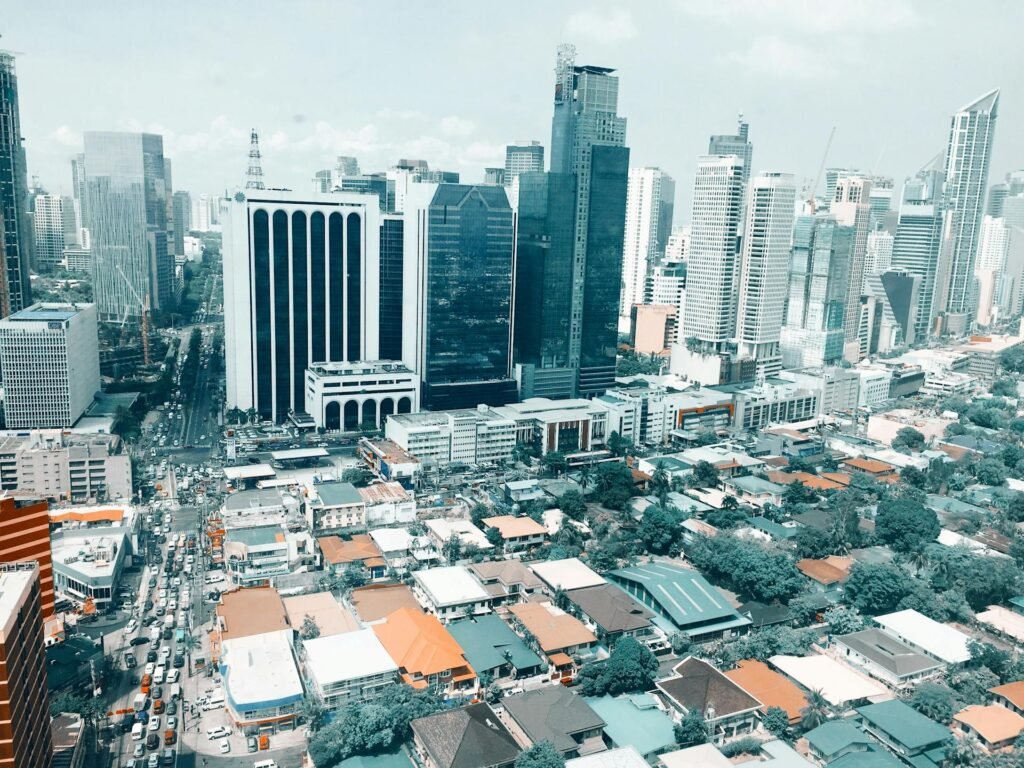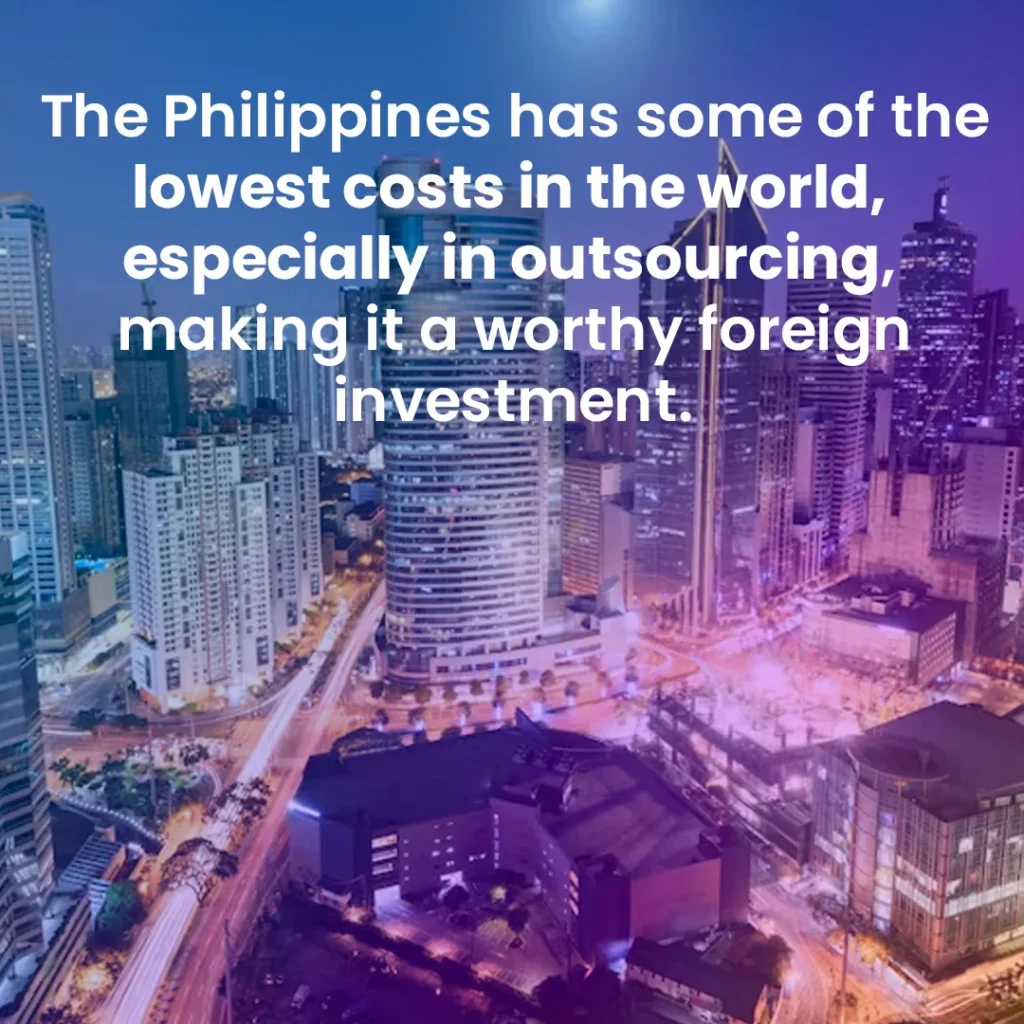- info@baysideoutsourceco.com
- Australia | Philippines
- info@outsourcepro.com.au
- Australia | Philippines
A Resilient Economy with a Thriving Outsourcing Industry and Robust International Relations
Ranked 18th out of 122 countries in the 2021 English Proficiency Index by Education First, the Philippines boasts remarkable English skills, second only to Singapore in Asia. English is an official language and is widely used in education and business, ensuring effective communication.
The Philippines is home to a vast pool of skilled professionals in IT, customer service, back-office operations, and beyond, ready to meet the demands of various industries!
The Philippines offers significantly lower labor costs compared to many Western countries, providing substantial cost savings for businesses.
Benefit from real-time collaboration with our strategically advantageous time zone, perfect for extending your business operations around the clock.
Rely on our robust IT and telecommunications infrastructure, designed to support high-demand outsourcing needs with reliability and efficiency.
Leverage our culturally diverse workforce, renowned for its adaptability and expertise in managing global customer interactions seamlessly.
Filipinos are known for their cultural affinity with Western countries, which fosters smoother collaboration and understanding between outsourcing partners.
Labor costs in the Philippines are relatively lower compared to many Western countries, offering significant cost savings for businesses.
Filipinos are renowned for their strong work ethic, dedication, and professionalism. They often demonstrate commitment to quality, efficiency, and reliability in their work.
Once a leading economy in Asia during the 1950s and 60s, the Philippines faced economic slowdowns in subsequent decades. However, the country has made a remarkable comeback, establishing itself as a prominent global hub for business process outsourcing (BPO). Currently, the sector employs over 1.3 million Filipinos and is projected to grow by approximately 9% annually through 2025. This resurgence is powered by the country’s workforce, renowned for its strong work ethic, professionalism, and dedication to quality, making Filipino professionals ideal for global business collaborations.

English remains a dominant language in the Philippines, ranking it among the top English-speaking countries worldwide. This linguistic capability is enhanced by the country’s educational system, which emphasizes English as a primary medium of instruction. The Filipino workforce is not only skilled but also culturally attuned to Western practices, making them highly customer-focused and adaptable in international business settings. The competitive cost of labor, approximately 35% of those in Western countries, offers potential savings of up to 75% on labor costs.

Geographically, the Philippines is strategically located in the heart of Southeast Asia, making it an excellent base for companies targeting the expansive ASEAN market. The country’s infrastructure has seen considerable improvements, with investments in transportation, digital connectivity, and energy, contributing to a high quality of life in major urban centers like Manila, Cebu, and Davao.

The Philippines’ educational sector continues to thrive, producing hundreds of thousands of highly motivated graduates annually, equipped with skills that meet international standards. The legal, financial, and governmental frameworks remain closely aligned with those of the United States, easing the way for Western businesses to operate effectively within the country.

The trade and investment relationship between the Philippines and Australia is robust, with two-way trade amounting to A$8.2 billion in 2022. Australia’s investments in the Philippines were A$7.0 billion, while Philippine investment in Australia was A$1.6 billion. This bilateral relationship is strengthened by multiple trade agreements and the prospects of elevating this to a Strategic Partnership.

Looking ahead to 2040, the Philippines aims to sustain high growth, with real GDP growth projected at around 6% annually over the next five years. Key sectors to watch include agriculture, education, resources, and green energy transition, with the latter seeing the Philippines set ambitious renewable energy targets for 2030 and 2044. The country’s focus on increasing investment in digitization, critical infrastructure, and clean energy are pivotal to its future economic trajectory.

The action plan includes raising awareness of the benefits of the ASEAN-Australia-New Zealand Free Trade Agreement (AANZFTA) and the Regional Comprehensive Economic Partnership (RCEP), removing blockages in trade, and building capabilities through cooperation on mining policy and public-private partnerships. These initiatives are designed to deepen understanding and cooperation between the Philippines and Australia, enhancing both countries’ economic and cultural ties.
In conclusion, the Philippines not only has rebounded but is thriving as a key player in the global market, offering an optimal mix of skilled labor, strategic location, and economic stability. This makes it an attractive destination for outsourcing and foreign investments, poised for significant growth in the coming decades.

For businesses and investors looking to explore opportunities in the Philippines, engaging with this dynamic market can offer substantial rewards. Whether in outsourcing, education, or green energy, the strategic initiatives and policies of the Philippine government provide a favorable environment for growth and investment.

Stay in the know with our newsletter! Sign up now to get updates, insights, and exclusive offers sent directly to your inbox.
BAYSIDEOUTSOURCECO | Designed and Developed By Empulse Digital
Copyright © 2024. All rights reserved.